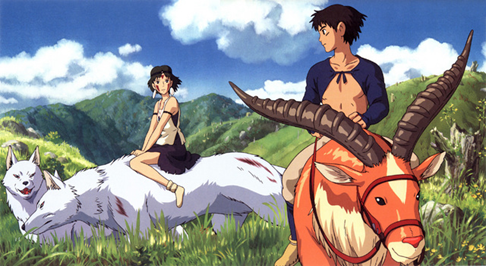Animation Appreciation: Princess Mononoke

I hate myself a little for declaring the darkest Hayao Miyazaki film to be my favourite one (like many, I credit the director as the brains behind a film, so Yoshifumi Kondo's Whipser of the Heart is not a Miyazaki movie to me, despite his extensive involvement), but damn, it's a great movie.
Princess Mononoke is the story of a changing era, one rooted in both reality and fantasy, and it is, like many fantasy stories, about the thinning of magic as technology marches on.
However, it refuses to settle on simple answers or simple portrayals. For me, Princess Mononoke was an early lesson in showing both sides of a conflict while still having a definite preference. Also in being less heavy-handed with the themes, allowing them to come out through the personalities of real characters, rather than mouthpieces.
And the ending is bittersweet.
Princess Mononoke is the story of Ashitaka, prince of the dwindling Emishi people. A boar-god (for this is the days when animals were kami, great and sapient gods of the forest), infected with hate, has given Ashitaka a tainted mark. Ashitaka's destiny is to leave home and find a cure before this mark grows, destroying his body and mind.
Ashitaka ends up in the midst of a war between Iron Town and the kami of the surrounding forest. On the side of the kami is San, the adopted human daughter of Moro, the wolf, while Lady Eboshi leads Iron Town, a metalworking fortress/camp and a place for the outcasts and the downtrodden. And there is the emperor, never seen, but his desire for the head of the Forest Spirit will change all of their lives.
It's clear Miyazaki sides with the world of nature, as Ashitaka falls in love with San and tries to protest Lady Eboshi's actions, while Eboshi, despite her compassion for human outcasts, aids in taking the Forest Spirit's head. By using a "neutral" character as a viewpoint, and giving Eboshi many positive traits (so much that Eboshi is my favourite character in the movie), the film is not ham-fisted.
Furthermore, while it's true that Iron Town is destroyed, the Forest Spirit gets its head back before it dies, and Eboshi is minus one arm, it isn't a whole victory. Eboshi promises to rebuild Iron Town, San and Ashitaka will stay apart, and we all know what Japan is like today.
It all suggests the battles have simply forestalled the inevitable. Industry will come, take over more of the forests, and the animals will become ordinary beasts. Lord Okoto, the other boar kami, has already said that it's happening, and he also dies in battle. While the characters have not worked for nothing, the story isn't as simple as the heroes triumphing over villains, or the reverse.
While I dislike rabid anime fans who believe the Japanese can teach Americans about complex storytelling, Princess Mononoke teaches some great lessons about writing. This is how you communicate themes gracefully. This is how you have sympathy for all of your characters and create a richer world by doing it. This is how you keep the audience guessing as to your ending.
Creating Ashitaka also helps. He isn't a completely neutral character, but he is a newcomer to the area and doesn't instantly choose sides, and so we can see both sides of the conflict through him. And thankfully, he doesn't become a cipher because of this role. Ashitaka is naive, but he has convictions and a strong will, so he isn't overshadowed.
It's also interesting that Ashitaka is male, and San and Eboshi are female. Usually it is the female character who is the stabilizing force between two warring males. Princess Mononoke reverses this role, and that in itself makes the film noteworthy. Women (including San's adoptive mother , the wolf Moro) are some of the most powerful and the most vicious beings in the script.
The story adds failure to this mix, as despite his moderate influence, Ashitaka cannot mediate. He tries to tell Eboshi about the thin ground she is treading on, but she does not listen. Ashitaka tries to "free" San, but ultimately cannot. She acknowledges her feelings for him, but will not leave the wolves.
Yet the film is not bleak. Ashitaka is cleared of his mark, and there are trees growing-there is even room to cheer for the hardy residents of Iron Town, who promise to rebuild. There is hope for the future, but the hope may involve adapting to change, accepting it, or you may end up nothing but dead meat.
Visually, Princess Mononoke is incredible. Gorgeous forest backgrounds, detailed costumes and animals, and huge, breathtaking vistas. Most of the CGI is also well-integrated, though there are a few hiccups. The Forest Spirit is a particular standout, a strange, eerie creature that operates in complete silence and embodies nature as a neutral and unpredictable force.
The dub is famous for being written by Neil Gaiman, and being the first of the many celebrity-voiced dubs produced by Disney (at this point, released through Miramax). I had this on English VHS for the longest time so the dub is burned into my brain, but in several places it sounds stiff and unnatural, despite the efforts of so many great people. It's not a bad dub, it's just not amazing.
But is this a beautiful film. Princess Mononoke simply deserves every ounce of praise it gets.